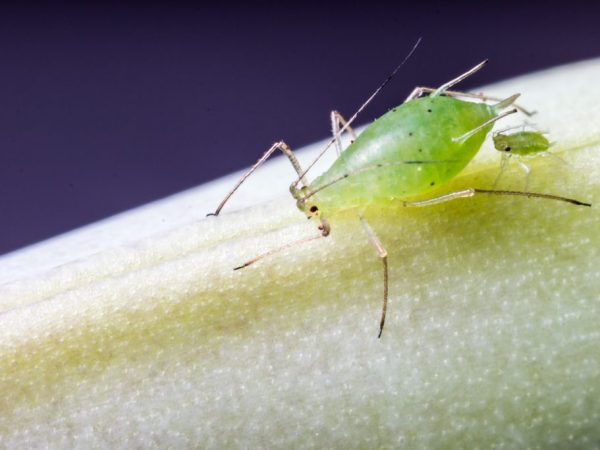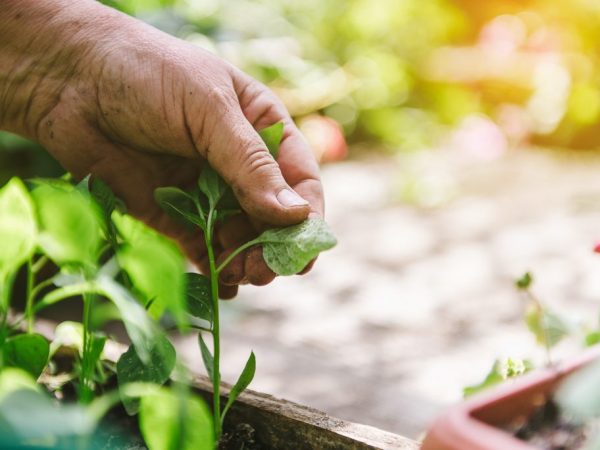How to eliminate aphids on pepper seedlings
Aphids on pepper seedlings are not uncommon. These insects are among the most common garden pests. Aphid colonies can reach colossal growth, attacking not only an individual seedling, but also the entire seedling completely.

How to eliminate aphids on pepper seedlings
Harm done
Aphids are a small oval-shaped insect that chooses the most delicate leaves and buds for their nutrition (tops of bushes and undersides of leaves). Insects feed on plant sap, which carries water and nutrients from the roots to the leaves. Due to lack of nutrition, the seedling slows down growth and may even die.
When eating plant sap, aphids release from its excess a sweet viscous solution (pad, it is also aphid milk), which attracts ants.
Aphid milk itself is harmless, but it provokes such problems for seedlings:
- the pad has a sticky consistency and collects dust that interferes with normal photosynthesis;
- the high amount of sugar in it contributes to the growth of mold and blackening of the leaves.
In addition, aphid saliva can contain toxins and viruses that also negatively affect the plant and weaken its immune system. Seedlings delay their growth and development, up to complete death. The later the infection occurs, the greater the chances of harvesting.
Signs of damage to seedlings
The aphid population consists of flying and flightless individuals. They multiply quickly and fill all plantings.
Due to their location (young shoots and the underside of more mature pepper foliage), pests often go unnoticed until irreversible damage to the plant occurs. It is too late to fight them at this stage.
But there are certain signals of the presence of aphids in seedlings:
- twisted leaves that quickly turn yellow and fall off;
- deformed branches that have stopped growth;
- shine and stickiness on plant tissues due to honeydew;
- crumbling inflorescences and the absence of new ovaries;
- egg clutches on the inside of the leaf.
For seedlings, it is extremely important to select an effective remedy that will quickly destroy insects. You also need to take into account the fact that some pesticides can negatively affect the plant itself, and can be harmful to humans.
Methods and means of struggle

It's hard to fight aphids
The choice of pest control method depends on the degree of damage to the plants.
Severe damage at the initial stage is an indication for the use of chemicals. Traditional methods are used mainly before budding and planting plants in open ground, and biological products and natural repellents are used for small foci of infection.
Chemicals
Powerful and effective toxic insecticides are usually used when it is no longer possible to successfully combat aphids with other methods. In this case, the back of the leaves is completely covered with small insects.
Such preparations are dangerous for humans, therefore, this method of processing is used mainly in industrial growing conditions. When using chemicals, follow the manufacturer's instructions.
The most effective means: Aktara, Karbofos, Fufanon, Intavir.
Biological methods and means
When using biological methods to combat aphids, natural enemies of these pests are attracted - birds (sparrows, linnet, wrens, titmice, beetles) and beneficial insects (ladybugs, flower girls, hoverflies, lacewings). To do this, chamomile, lavender, yarrow, parsley, mint, daisies, basil or coriander are planted next to the seedlings. In more advanced cases, biological analogues of insecticides are used.
The action of bioinsecticides is entirely based on the use of natural substances (extracts from herbs) that can destroy pests. These are effective and safe drugs for humans - Fitoverm, Akarin, Boverin.
Folk methods and means
To obtain an environmentally friendly and harmless crop for humans, folk remedies are used. But their effectiveness is not as high as that of chemical insecticides and bioinsecticides, therefore, with deep damage to seedlings, multiple treatments will be required.
The most famous folk remedies for aphid control include:
- laundry soap solution;
- infusion of wood ash;
- herbal infusions (mainly with the addition of hot pepper or citrus peels);
- essence of spruce needles;
- fumigation with tobacco smoke;
- ammonia solution;
- hydrogen peroxide solution;
- infusion of tobacco.
To increase the effectiveness of the fight against aphids on pepper seedlings, one should not forget about the methodical implementation of preventive treatment of plants. This reduces the risk of infection.
Prevention of aphid infestation
Infection of seedlings with aphids is usually caused by insufficient control and neglect of preventive measures. Increased control is the most important way to control insects on seedlings. After all, the sooner the pests are discovered, the more chances there will be to get rid of them without harming the plant.
Aphids fall on seedlings:
- through the clothes;
- with poorly processed seed (seeds and seedlings);
- from poorly treated soil.
The most effective treatment method is soil disinfection by calcining, and seeds - with a weak solution of potassium permanganate. The healthier the seedlings of peppers, the more immunity they have against aphids and other pests.
Conclusion
Fighting aphids on pepper seedlings is a laborious process, the effectiveness of which depends on a timely and correctly selected remedy. Properly performed preventive measures can significantly reduce the risk of infection of pepper seedlings and contribute to obtaining a rich harvest.
Modern control methods can help preserve the plant and prevent crop losses. It should be borne in mind that aphids very quickly restore their population, the question of the promptness of the beginning of treatment measures can become decisive.


